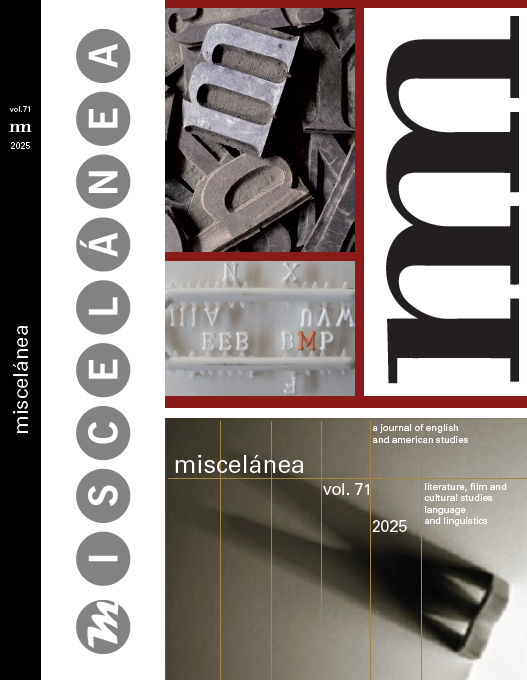The Medarchy: Medical Discipline and the Panopticon in Caduceus Wild
DOI:
https://doi.org/10.26754/ojs_misc/mj.202510413Keywords:
medicine, panopticon, power, speculative fiction, disciplineAbstract
This article explores the paradoxical nature of biopower when social, political and economic interests clash with individuality and autonomy. Special emphasis is placed on the Foucauldian concept of the panopticon to examine the mechanisms of (self-) surveillance as the most effective instruments of social control. Taking the recent pandemic as the starting point for critical reflection, this article raises questions about the purview of biopower through the analysis of the speculative novel Caduceus Wild, published in 1959 by Ward Moore with Robert Bradford. This analysis first focuses on the panopticon as the main instrument of discipline to contain the global health crisis provoked by the coronavirus. Secondly, it examines the particularities of
healthcare dystopias. Finally, it explores the potential of the discourses of biopower to transform the institutional authority of medicine acting in the name of public health
into an oppressive system of social control by adopting the form of a totalitarian medical regime, as described in the fictional world imagined by Moore and Bradford.
Display downloads
References
ATWOOD, Margaret. 1998. The Handmaid’s Tale. Anchor Books.
ATWOOD, Margaret. 2015. The Heart Goes Last. Virago.
BACCOLINI, Raffaella and Tom MOYLAN. 2003. “Dystopia and Histories”. In Dark Horizons: Science Fiction and the Dystopian Imagination. Routledge: 1-12.
BURY, Michael. 2005. “Postmodernity and Health”. In Scambler, Graham and Paul Higgs (eds.) Modernity, Medicine and Health: Medical Sociology Towards 2000. Routledge: 1-28.
CHOWKWANYUN, Merlin. 2019. “The Fall and Rise of Mid-Century Student Health Activism: Political Repression, McCarthyism, and the Association of Internes and Medical Students (1947-1953)”. Journal of the History of Medicine and Allied Sciences 74 (2): 127-144. DOI: https://doi.org/10.1093/jhmas/jrz026
CISNEY, Vernon W. and Nicolae MORAR. 2015. Biopower: Foucault and Beyond. University of Chicago Press. DOI: https://doi.org/10.7208/chicago/9780226226767.001.0001
COUCH, Danielle L., Priscilla ROBINSON and Paul A. KOMESAROFF. 2020. “COVID-19 -Extending Surveillance and the Panopticon”. Journal of Bioethical Inquiry 17 (4): 809-814. DOI: https://doi.org/10.1007/s11673-020-10036-5
CRAWFORD, Robert. 1980. “Healthism and the Medicalization of Everyday Life”. International Journal of Health Services 10 (3): 365-388. DOI: https://doi.org/10.2190/3H2H-3XJN-3KAY-G9NY
DOWNING, Raymond. 2011. Biohealth. Beyond Medicalization: Imposing Health. Pickwick.
EVANS, Robin. 1971. “Bentham’s Panopticon: An Incident in the Social History of Architecture”. Architectural Association Quarterly 3 (2): 21-37.
FALCUS, Sarah. 2020. “Age and Anachronism in Contemporary Dystopian Fiction”. In Barry, Elizabeth and Margery Vibe Skagen (eds.) Literature and Ageism. D. S Brewer: 65-85. DOI: https://doi.org/10.1017/9781787449398.004
FOUCAULT, Michel. 1978. The History of Sexuality. Volume I: An Introduction. Trans. Robert Hurley. Pantheon Books.
FOUCAULT, Michel. 1995. Discipline and Punish. The Birth of the Prison. Trans. Alan Sheridan. Vintage Books.
FOUCAULT, Michel. 2003. The Birth of the Clinic: An Archaeology of Medical Perception. Trans. Alan Sheridan. Routledge.
FRANK, Arthur W. 1991. “From Sick Role to Health Role: Deconstructing Parsons”. In Robertson, Roland and Bryan S. Turner (eds.) Talcott Parsons: Theorist of Modernity. Sage Publications: 205-216.
GERE, Cathy. 2017. Pain, Pleasure, and the Greater Good: From the Panopticon to the Skinner Box and Beyond. The University of Chicago Press. DOI: https://doi.org/10.7208/chicago/9780226501994.001.0001
HOLMQVIST, Ninni. 2008. The Unit. Trans. Marlaine Delargy. One World.
HOLST, Jens and Remco VAN DE PAS. 2023. “The Biomedical Securitization of Global Health”. Global Health 19 (15): 1-9. DOI: https://doi.org/10.1186/s12992-023-00915-y
ISHIGURO, Kazuo. 2005. Never Let Me Go. Faber.
LUPTON, Deborah. 2012. Medicine as Culture: Illness, Disease and the Body. SAGE. DOI: https://doi.org/10.4135/9781446254530
MARINKER, Marshall. 1975. “Why Make People Patients?” Journal of Medical Ethics 1 (2): 81-84. DOI: https://doi.org/10.1136/jme.1.2.81
MCALEAR, Rob. 2010. “The Value of Fear: Toward a Rhetorical Model of Dystopia”. Interdisciplinary Humanities 27 (2): 24-42.
MOORE, Ward and Robert BRADFORD. 1959a. “Caduceus Wild”. The Original Science Fiction Stories (January): 6-73.
MOORE, Ward and Robert BRADFORD. 1959b. “Caduceus Wild”. The Original Science Fiction Stories (February): 60-122.
MOORE, Ward and Robert BRADFORD. 1959c. “Caduceus Wild”. The Original Science Fiction Stories (March): 68-113.
MOORE, Ward and Robert BRADFORD. 1959d. “Caduceus Wild”. The Original Science Fiction Stories (May): 69-115.
MOORE, Ward. 1978. Caduceus Wild. Pinnacle Books.
MORDACCI, Roberto. 1998. “The Desire for Health and the Promises of Medicine”. Medicine, Health Care and Philosophy 1: 21-30. DOI: https://doi.org/10.1023/A:1009917404217
ORWELL, George. 1949. Nineteen Eighty-Four. Harcourt, Brace & World.
OSMOND, Humphry. 1980. “God and the Doctor”. The New England Journal of Medicine 10 (302): 555-558. DOI: https://doi.org/10.1056/NEJM198003063021005
ROTHMAN, Barbara Katz. 2021. The Biomedical Empire: Lessons Learned from the COVID-19 Pandemic. Standford U.P.
SMITH-PREI, Carrie. 2012. “Relevant Utopian Realism: The Critical Corporeality of Juli Zeh’s Corpus Delicti”. Seminar: A Journal of Germanic Studies 48 (1): 107-123. DOI: https://doi.org/10.1353/smr.2012.0000
SVENAEUS, Fredrik. 2000. The Hermeneutics of Medicine and the Phenomenology of Health: Steps Towards a Philosophy of Medical Practice. Kluwer.
TURNER, Bryan S. 2001. “Disability and the Sociology of the Body”. In Albrecht, Gary L., Katherine Seelman and Michael Bury (eds.) Handbook of Disability Studies. SAGE: 252-266. DOI: https://doi.org/10.4135/9781412976251.n10
VARUL, Matthias Zick. 2010. “Talcott Parsons, the Sick Role and Chronic Illness”. Body & Society 16 (2): 72-94. DOI: https://doi.org/10.1177/1357034X10364766
WELSH, Talia. 2022. Feminist Existentialism, Biopolitics, and Critical Phenomenology in a Time of Bad Health. Routledge. DOI: https://doi.org/10.4324/9781003168676
WENDELL, Susan. 1996. The Rejected Body: Feminist Philosophical Reflections on Disability. Routledge.
WILLIAMS, Simon J. 2005. “Parsons Revisited: From the Sick Role to…?” health: An Interdisciplinary Journal for the Social Study of Health, Illness and Medicine 9 (2): 123-144. DOI: https://doi.org/10.1177/1363459305050582
ZOLA, Irving Kenneth. 1976. “Medicine as an Institution of Social Control”. Ekistics 41 (24): 210-214.
ZOLA, Irving Kenneth. 1986. “Illness Behaviour - A Political Analysis”. In McHugh, Sean and T. Michael Vallis (eds.) Illness Behavior: A Multidisciplinary Model. Plenum Press: 213-218. DOI: https://doi.org/10.1007/978-1-4684-5257-0_14
Published
Issue
Section
License
Copyright (c) 2025 Shadia Abdel-Rahman Téllez

This work is licensed under a Creative Commons Attribution-NonCommercial 4.0 International License.
How to Cite
Accepted 2024-11-20
Published 2025-06-26
Funding data
-
Ministerio de Universidades
Grant numbers Margarita Salas para la formación de Jóvenes doctores


